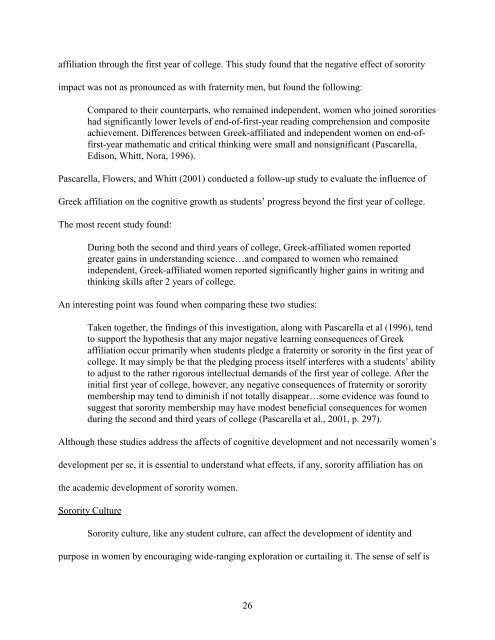Sorority Rituals - Reflections On Rites of ... - Mari Ann Callais
Sorority Rituals - Reflections On Rites of ... - Mari Ann Callais
Sorority Rituals - Reflections On Rites of ... - Mari Ann Callais
You also want an ePaper? Increase the reach of your titles
YUMPU automatically turns print PDFs into web optimized ePapers that Google loves.
affiliation through the first year <strong>of</strong> college. This study found that the negative effect <strong>of</strong> sorority<br />
impact was not as pronounced as with fraternity men, but found the following:<br />
Compared to their counterparts, who remained independent, women who joined sororities<br />
had significantly lower levels <strong>of</strong> end-<strong>of</strong>-first-year reading comprehension and composite<br />
achievement. Differences between Greek-affiliated and independent women on end-<strong>of</strong>first-year<br />
mathematic and critical thinking were small and nonsignificant (Pascarella,<br />
Edison, Whitt, Nora, 1996).<br />
Pascarella, Flowers, and Whitt (2001) conducted a follow-up study to evaluate the influence <strong>of</strong><br />
Greek affiliation on the cognitive growth as students’ progress beyond the first year <strong>of</strong> college.<br />
The most recent study found:<br />
During both the second and third years <strong>of</strong> college, Greek-affiliated women reported<br />
greater gains in understanding science…and compared to women who remained<br />
independent, Greek-affiliated women reported significantly higher gains in writing and<br />
thinking skills after 2 years <strong>of</strong> college.<br />
An interesting point was found when comparing these two studies:<br />
Taken together, the findings <strong>of</strong> this investigation, along with Pascarella et al (1996), tend<br />
to support the hypothesis that any major negative learning consequences <strong>of</strong> Greek<br />
affiliation occur primarily when students pledge a fraternity or sorority in the first year <strong>of</strong><br />
college. It may simply be that the pledging process itself interferes with a students’ ability<br />
to adjust to the rather rigorous intellectual demands <strong>of</strong> the first year <strong>of</strong> college. After the<br />
initial first year <strong>of</strong> college, however, any negative consequences <strong>of</strong> fraternity or sorority<br />
membership may tend to diminish if not totally disappear…some evidence was found to<br />
suggest that sorority membership may have modest beneficial consequences for women<br />
during the second and third years <strong>of</strong> college (Pascarella et al., 2001, p. 297).<br />
Although these studies address the affects <strong>of</strong> cognitive development and not necessarily women’s<br />
development per se, it is essential to understand what effects, if any, sorority affiliation has on<br />
the academic development <strong>of</strong> sorority women.<br />
<strong>Sorority</strong> Culture<br />
<strong>Sorority</strong> culture, like any student culture, can affect the development <strong>of</strong> identity and<br />
purpose in women by encouraging wide-ranging exploration or curtailing it. The sense <strong>of</strong> self is<br />
26



